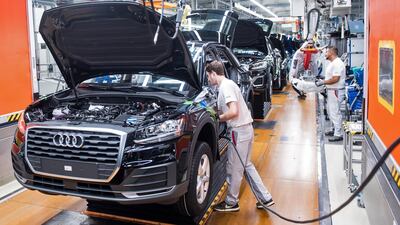Signs are growing that Audi is poised to add China’s largest carmaker as a manufacturing partner as the German premium brand pushes to regain share lost to Mercedes-Benz and BMW in the world’s biggest market.
Audi parent Volkswagen and China’s SAIC Motor invited parts makers to bid to become suppliers for an Audi A7L they plan to build, according to a document they posted on the website of China Bidding and Purchasing Network. Interested bidders can obtain bidding documents by December 9, according to the statement posted on December 2.
The document suggests that long-time talks between Volkswagen and SAIC over Audi have progressed to the point that they can start laying the groundwork to set up a supply chain. Audi, which has thus far had China FAW Group as its sole China manufacturing partner, has faced opposition to the SAIC plan from dealerships concerned that they would lose business.
Audi dealers said in February 2017 that they would drop opposition to a second joint venture once the German car maker reaches sales of 1 million cars a year in the country. Audi delivered just over 663,000 vehicles in China last year, narrowly beating Daimler AG’s Mercedes-Benz with 653,000 cars. BMW sold about 640,000 vehicles, including Mini cars.
SAIC and Volkswagen have been in talks to expand co-operation to include Audi and the two parties have come up with preliminary plan as per what cars they would make together, SAIC chairman Chen Hong told shareholders in May.
After entering the country in the late 1980s with FAW and building an early lead, Audi sales rose and the marquee became the quasi-official ride of high-ranking government officials and privileged businessmen. Yet Audi recorded its first annual sales drop in China in more than a quarter century in 2015, and Mercedes-Benz and BMW have won over buyers with new designs.
SAIC will communicate to media about its plan with Audi at an appropriate time next year, the Chinese carmaker told Bloomberg, declining to elaborate. An Audi representative in China didn’t immediately return a call and an email seeking comment, while a spokesman in Germany declined to comment.

